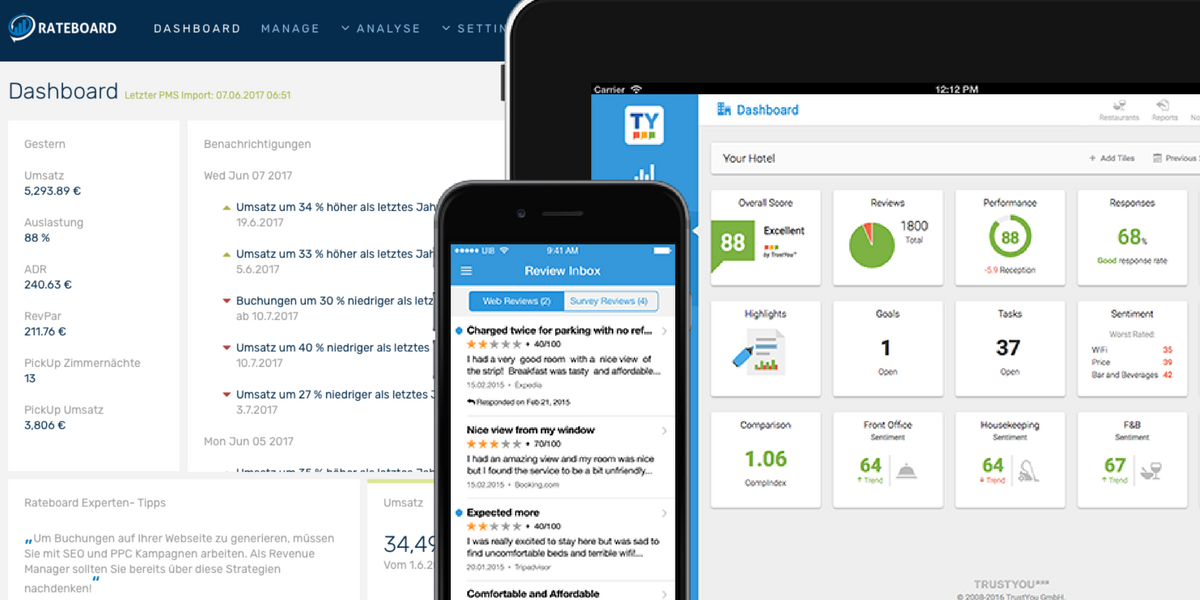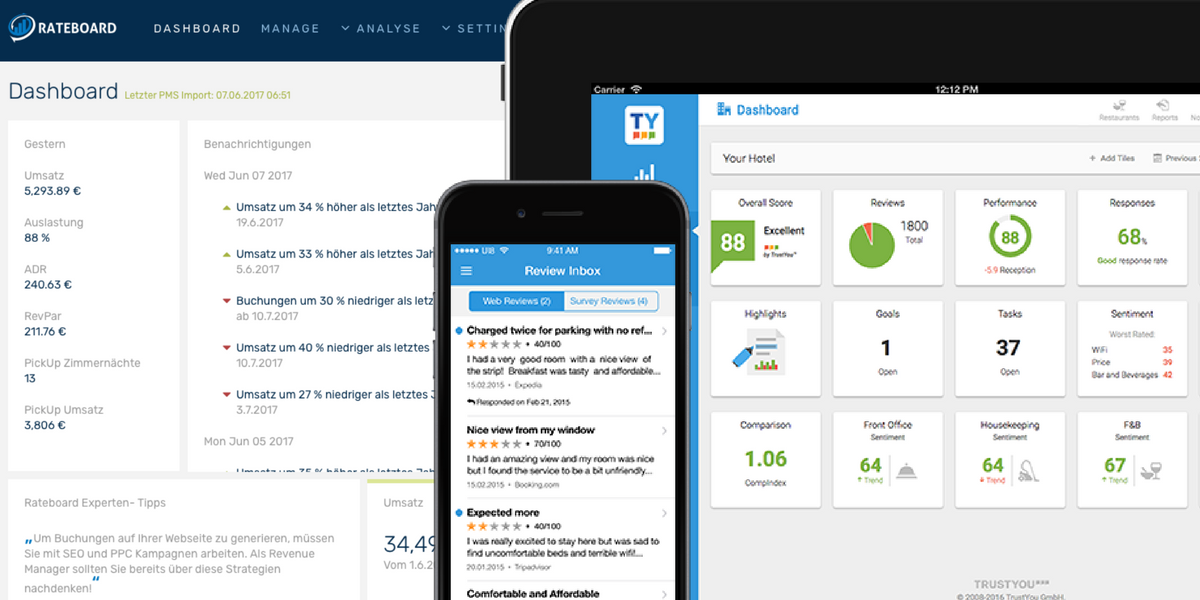
Adriana
Partner Manager
March 27, 2018
Hotel trends
With good guest rating and the appropriate pricing strategy to success
Only a few companies have so much and good information about their own operations and the customers as hoteliers. Due to the IT systems used, there is a large variety of information about guests, utilization, sales, reviews, website traffic and much more. In the rarest cases, however, these data find the right use and therefore remain unused. Learn more about how your business strategy can be optimized through revenue management and reviews in the following article.

Revenue management strongly influences the success of a hotel. Simply selling as many rooms as possible at a pre-determined price can be profitable but does not lead to optimal sales results. Following a clear pricing strategy is the key to success here. The goal is to sell the right product, at the right price, at the right time, to the right customer via the right distribution channel. This requires a comprehensive analysis of hotel internal and external data. On the one hand, the hotelier can use the Property Management System (PMS) as data sources. Above all, comparisons of capacity utilization, sales and average price give a good insight into the current course of business. The analyzes only become really powerful in connection with evaluations of competitor prices, weather data, holiday times and events or guest reviews, all information that can be filtered from the most diverse portals on the internet.
The difficulty here is to bundle the information of different formats and sources in one place in order to be able to carry out a profound data analysis. This time-consuming work is best done by Revenue Management Software. The software provides access via interfaces to the hotel software, OTA's, Meta research programs, etc. Thus, all information is collected in the software and can be processed in a user-friendly manner.The purpose of the analyzes is to help hotels make better business decisions, thereby optimizing processes, especially profitability. The data is evaluated to reveal hidden patterns, unknown connections and other useful information. Hotel-internal key figures such as utilization, PickUp, RevPar and booking forecasts can be queried here.
Ideally, these ratios can be combined with those from an online reputation management software to analyze guest reviews and implement appropriate measures that improve the quality of the hotel offer. RateBoard has integrated the TrustYou Meta Reviewer. Of course, an optimized offer based on guest feedback will again result in better ratings, which will make the hotel more likely to be booked. A study by our partner TrustYou has shown that 76% of travelers are willing to pay more for a better rated hotel, and that for the same price travelers are 3.9 times more likely to choose the hotel that is better rated. A higher rating gives the hotel the scope to increase the daily average rate and increase sales. Through appraisal management, hoteliers can also address criticism or comments directly and personally, verifiably enhancing guest satisfaction. The trick is to keep an eye on the reviews of all sources scattered across the web and to analyze them as profitably as possible. These are five rating metrics that every hotel should consider:
1) Performance grade
For a quick overview of the quality of the services provided by the hotel, hoteliers should use the performance rating. This metric is calculated using an evaluation algorithm that reviews every hotel rating that has been posted on the web. This allows hoteliers to identify trends and realize how well the hotel is compared to its competitors.
2) Recommendation rates
This measure indicates whether the guest will return to your hotel and if he will recommend your hotel to others. This is a good measure of your offline word of mouth, especially considering the trends over time.
3) Sentiment notes
The sum of the sentiment notes defined the overall rating of a hotel. "Sentiments" are based on the sophisticated semantic language analysis that TrustYou applies to each assessment. Thus, the hotel can invest specifically in the areas that have the highest impact on the ratings. For example, TrustYou has grouped together Food & Beverage, Front Office, Housekeeping and Spa, which are key sentiment categories essential to the operational environment. Overall, TrustYou analyzes over 120 different categories that can be closely monitored and analyzed by the hotel.
4) Influence notes
With the influence notes developed by TrustYou, the hotel can prioritize which areas, e.g. Reception, room cleanliness or breakfast should be improved first. The sentiment categories provide insights that influence the overall score, so your hotel can invest in the top 3 areas that have the most negative impact on your ratings.
5)Response rates
Although the rate, which indicates the number of hotel responses to ratings, is a softer index, it is of enormous importance. Studies show that hotels that respond to ratings score 6% higher than those who do not. Another benefit of increasing the response rate is that you can directly influence them - and both future and former guests can see that you value their opinion.
TrustYou offers hotels the opportunity to test these and all other functions and key figures in the platform for 14 days free of charge under this link.
To get in contact with RateBoard, please write an e-mail to info(at)rateboard.io
SHARE

Subscribe To Our Newsletter
Sign up now and receive monthly hotel and revenue management insights.
